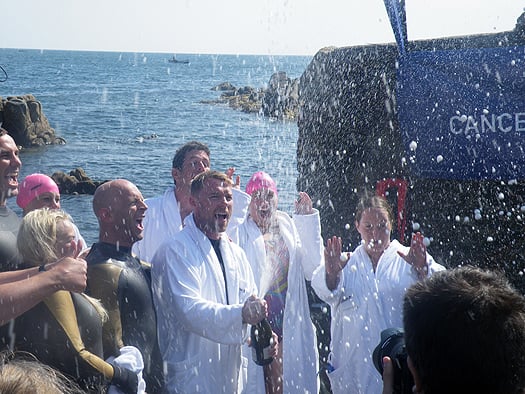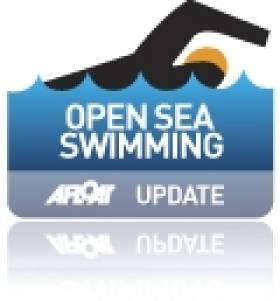Displaying items by tag: keating
No Bare Chest but Ronan Keating Completes Charity Swim
Five brave celebrities have completed a once in a lifetime challenge, arriving at the north pier at Wicklow Bay, Ireland yesterday morning at 08:18am, after a 35 hours and 18 minutes, 56 mile swimming relay across the Irish Sea to raise £1 million for Cancer Research UK.
Afloat's photo though is taken off Sandycove for a 'final' swim ashore at The Forty Foot (for media/PR purposes) though he swim team actually completed the swim beforehead in Wicklow Harbour. Taxis awaited the celebrities at Sandycove and subsequently the support vessels berthed at the East Pier in Dun Laoghaire.
Boy-band legend, Ronan Keating, gadget guru Jason Bradbury, 'fearless' TV presenter Jenny Frost, former British butterfly swimmer and Olympic medallist Steve Parry, and plucky Pamela Stephenson, made up the team of ten, including two members of the public, who swam across the Irish Sea in Cancer Research UK's first celebrity led challenge The Samsung Galaxy S II Swim.

Ronan Keating Celebrates in Sandycove yesterday. Photo: Jehan Ashmore
Captain of The Samsung Galaxy S II Swim, Ronan Keating, said: "I can't believe we finally made it to Ireland. Fifty six miles later it's an incredible achievement and I'm so proud of the team. You can still sponsor the team at www.virginmoneygiving.com/team/theswim."
Steve Parry, first to touch land this morning, said: "I've been swimming for the majority of my life and The Swim has been the biggest challenge of my life. It's been a fantastic team of open water swimmers and adventurous celebrities who have come together for an amazing challenge to raise £1million for Cancer Research UK's life-saving work."
Two members of the public swam with the celebrity team across the Irish Sea. The two lucky swimmers were picked from a host of people who signed themselves up for swimming trials in Brighton in August. Olly White (33 year old teacher from Devon) and Nikki Fraser (18 year old student from Yorkshire), are both keen open water swimmers and were invaluable members of The Swim team.
After touching down at the north pier in Wicklow Bay the team are now back on the boat and making their way to the Forty Foot in Dunleary where they will get back in the water and swim to land for a second time this morning to greet their friends and family who are waiting anxiously for them on the shore.
For more information on The Swim or to sponsor the team, please visit www.the-swim.co.uk





























































